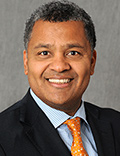Making Kidney Transplants Accessible in Washington, DC
The GW Transplant Institute performs kidney transplants using kidneys from both living and deceased donors. This process may include:
- Pre-transplant care and listing for transplants
- Transplant surgery utilizing advanced techniques and equipment
- Post-transplant care
- Advanced transplant protocols
- Transplant biopsies
- Transplant related laboratory tests
Schedule an In-Person or Virtual Appointment or Kidney Screening
Please fill out our general appointment form below or call our referral service at 202-715-4225 to schedule an in-person or virtual appointment. Virtual Health enables you to speak with providers using your phone, tablet or computer.
Patient Success Story
Paul Smith was sick and needed a kidney transplant. His friend, Jafau Delane, and the transplant team at GW Hospital came to the rescue. Paul now lives a normal, healthy, happy life.
Surgical Options
The GW Transplant Institute offers a variety of surgical procedures using advanced technology and equipment, including:
Deceased Donor Transplant: A patient receives a transplant from a deceased donor.
Living Donor Transplant: A family member or a friend agrees to donate a healthy kidney to someone with end-stage renal disease. This is a scheduled surgery. Learn more about being a living donor.
Laparoscopic Donor Surgery: A surgeon performs a transplant through small incisions with a shortened hospital stay and recovery time.
ABO Incompatible Kidney Transplant: If a recipient’s blood contains antibodies that react to a potential donor's blood type, the antibody reaction will immediately reject the transplant. Until recently, the only option was to identify recipient-donor transplant pairs with compatible blood types. ABO incompatible kidney transplant now allows transplants between some individuals with different blood types.
Desensitization for Transplant: Sensitized kidney transplant patients have high antibody levels that react to foreign tissue. This can prevent a person from having a donor kidney match. Desensitization is a process in which antibodies are removed from the blood through plasma exchange. After each treatment, clinicians give a drug to the patient to help prevent antibodies from coming back. Typically, two to four treatments are required prior to transplant.
Auto Transplant: A surgeon removes a kidney and transplants it in a different location within that person to improve renal function.
Living Donor Paired Kidney Exchange: A living donor donates a kidney to another recipient who also has an incompatible or poorly compatible donor. This increases the amount of individuals receiving a transplant. An altruistic donor may also start a kidney transplant exchange.
Podcast: The Use of New Technologies to Increase Kidney Transplantation in Minority Patients
In this segment, Keith Melancon, MD, discusses new technologies designed to address the problematic limited pool of kidney donors in African American and Hispanic populations.
Hepatitis C Transplants
Hepatitis C is a virus that typically causes an infection after blood borne transmission (like I.V. drug abuse). Young people who abuse drugs can be infected and sometimes die unexpectedly from narcotic overdose. These young people tend to have normal kidney function and although dying under tragic circumstances, their families give consent to have this sad situation benefit patients who need organ transplants. People who sign up to receive organs from individuals infected with hepatitis C can receive these organs and have the hepatitis C virus eradicated with novel medications.
Kidney Transplant 101 at GW Hospital
Chet “C. Alan” Bennett, also known as Chef Benne, received a kidney transplant at GW Hospital. In part one of this video, Chef Benne shares his experience in a discussion with Dr. Keith Melancon, Chief of the GW Transplant Institute and Medical Director at the Ron and Joy Paul Kidney Institute. The two also talk about kidney disease in general, as well as the family-like atmosphere at the Institute.
In part two, Chef Benne and Dr. Melancon continue their discussion. They talk about end-stage kidney disease, signs of kidney disease, candidacy for kidney transplant and more.
Meet the Team
Joseph Keith Melancon, MD
 Dr. Melancon is Professor of Surgery, George Washington University; Chief, Transplant Institute and Division of Transplant Surgery; and Medical Director, Ron and Joy Paul Kidney Center.
Dr. Melancon is Professor of Surgery, George Washington University; Chief, Transplant Institute and Division of Transplant Surgery; and Medical Director, Ron and Joy Paul Kidney Center.
Pablo Serrano Rodriguez, MD
 Dr. Serrano is an Assistant Professor of Surgery and Surgical Director of the Pancreas Transplant Program.
Dr. Serrano is an Assistant Professor of Surgery and Surgical Director of the Pancreas Transplant Program.
Ann Parker
Ann Parker is the Transplant Director of The George Washington University Hospital Liver Transplant Program.
The GW Transplant Institute
2131 K Street NW, Suite 800
Washington, DC 20037
Phone: 202-715-4225

The Ron and Joy Paul Kidney Center is focused on fighting kidney disease and encouraging transplants.
